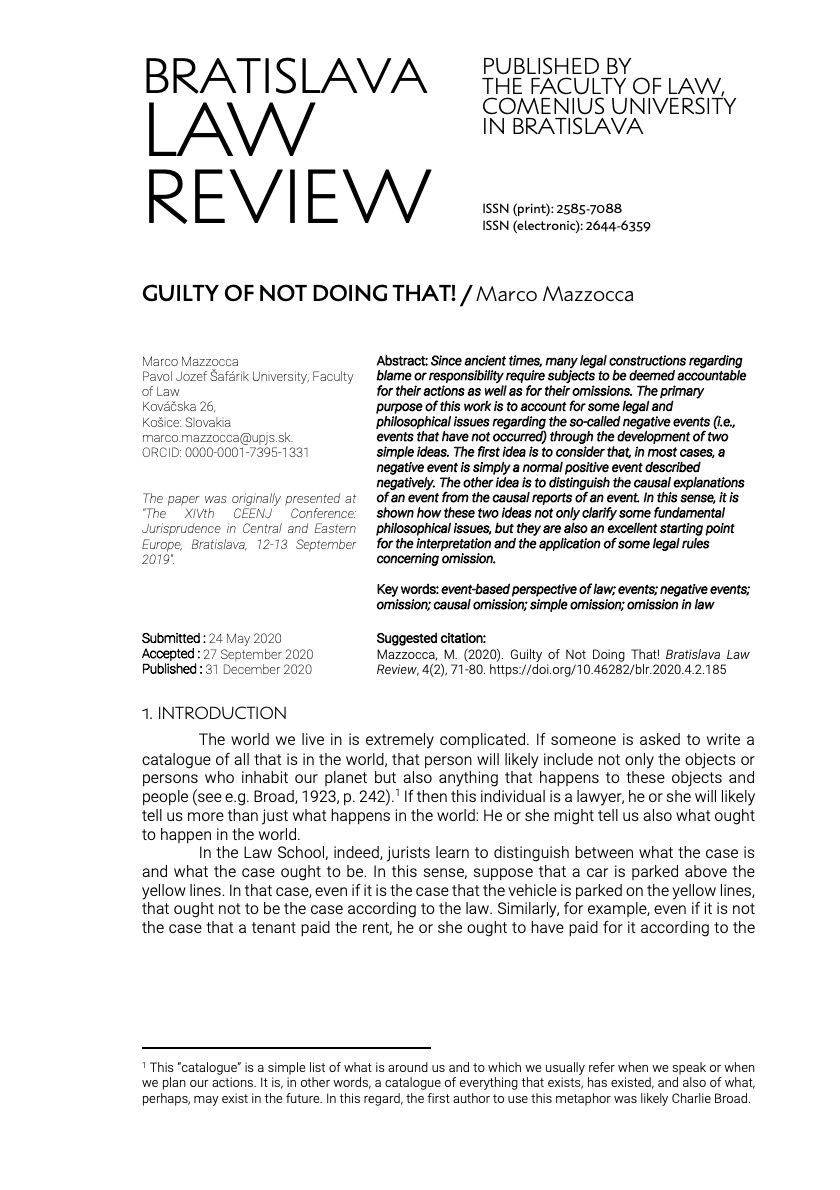Guilty of not doing that!
DOI:
https://doi.org/10.46282/blr.2020.4.2.185Keywords:
Event-based perspective of law, events, negative events, omission, causal omission, simple omission, omission in lawAbstract
Since ancient times, many legal constructions regarding blame or responsibility require subjects to be deemed accountable for their actions as well as for their omissions. The primary purpose of this work is to account for some legal and philosophical issues regarding the so-called negative events (i.e., events that have not occurred) through the development of two simple ideas. The first idea is to consider that, in most cases, a negative event is simply a normal positive event described negatively. The other idea is to distinguish the causal explanations of an event from the causal reports of an event. In this sense, it is shown how these two ideas not only clarify some fundamental philosophical issues, but they are also an excellent starting point for the interpretation and the application of some legal rules concerning omission.
References
Italy, Criminal Code
Beebee, H. (2004). Causing, and Nothingness. In J. Collins, N. Hall, & L. A. Paul (Eds.), Causation and Counterfactuals. (pp. 291–308). Cambridge: MIT Press.
Berto, F. (2010). L’esistenza non è logica. Dal quadrato rotondo ai mondi impossibili. Rome: Laterza.
Bix, B. (2000). On the Dividing Line between Natural Law Theory and Legal Positivism. Notre Dame Law Review., 75(5), 1613–1624.
Bonino, G. (2014). On Russell’s Robust sense of Reality. In G. Bonino, G. Jesson, & J. Cumpa (Eds.), Defending realism: ontological and epistemological investigations. (pp. 363–378). Boston: De Gruyter.
Broad, C. D. (1923). Scientific Thought. London: Routledge & Kegan Paul.
Davidson, D. (1985). Reply to Bruce Vermazen. In B. Vermazen & M. B. Hintikka (Eds.), Essays on Davidson: Actions and Events. (pp. 172–176). Oxford: Clarendon Press.
Evans, J. S. B. T., & Elqayam, S. (2018). How and why we reason from is to ought. Synthese, 197(4), 1429–1446. Retrieved from https://doi.org/10.1007/s11229-018-02041-4
Green, M. S. (2005). Legal Realism as Theory of Law. William & Mary Law Review., 46(6), 1915–2000.
Kim, J. (1973). Causation, Nomic Subsumption, and the Concept of Event. The Journal of Philosophy., 70(8), 217–236.
Meinong, A. (1904). Über Gegenstandstheorie. In A. Meinong (Ed.), Untersuchungen zur Gegenstandstheorie und Psychologie. (pp. 1–50). Barth: Leipzing.
Quine, W. V. (1948). On What There Is. Review of Metaphysics., 2(5), 21–38.
Quine, W. V. (1960). Word and Object. Cambridge: MIT Press.
Russell, B. (1905). On denoting. Mind., 14(56), 479–493.
Russell, B. (1919). Introduction to Mathematical Philosophy. London: George Allen & Unwin.
Sinha, S. P. (1976). The Fission and Fusion of Is-Ought in Legal Philosophy. Villanova Law Review., 21(5), 839–859.
Tuzet, G. (2013). The Omission Dilemma. SSRN Electronic Journal. Retrieved from https://doi.org/10.2139/ssrn.2887393
Varzi, A. C. (2001). Parole, oggetti, eventi e altri argomenti di metafisica. Rome: Carocci.
Varzi, A. C. (2006). The Talk I was Supposed to Give…. In A. Bottani & R. Davies (Eds.), Modes of Existence. Papers in Ontology and Philosophical Logic. (pp. 131–152). Frankfurt: Ontos.
Varzi, A. C. (2007). Omissions, and Causal Explanations. In F. Castellani & J. Quitterer (Eds.), Agency and Causation in the Human Sciences. (pp. 155–167). Paderborn: Mentis Verlag.
Williams, D. C. (1953). On the Elements of Being. Review of Metaphysics., 7(1), 3–18.
Zanetti, G. (2017). I limiti del diritto. Aspetti del dibattito contemporaneo. Rivista Di Filosofia Del Diritto., 6(Special Issue), 25–40. Retrieved from https://doi.org/http://dx.doi.org/10.4477/88290

Downloads
Published
License
Copyright (c) 2020 Bratislava Law Review

This work is licensed under a Creative Commons Attribution-NonCommercial-NoDerivatives 4.0 International License.
The Author(s) transfers copyright to the Article to the Publisher of the Journal by the Licence Agreement.
The Author(s) retains rights specified in the Licence Agreement.
The readers may read, download, copy, distribute, print, search, or link to the full texts of all of the Article of the Journal and use them for any other lawful purpose under specified Creative Commons Licence (CC BY-NC-ND 4.0).











